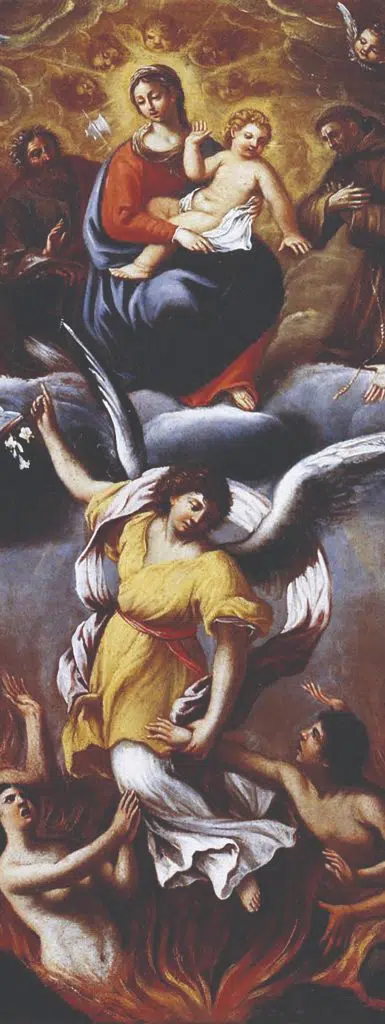Who’s in Hell?
 Question of Faith: If saints are known to be in heaven, are there particular souls known to be in hell?
Question of Faith: If saints are known to be in heaven, are there particular souls known to be in hell?
The Church does not judge whether certain souls are in hell. Such judgment is for God alone. Even those individuals who appear to have lived contrary to Christ’s teachings may still be saved through repentance. The Church emphasizes the possibility of conversion for each person and trusts in the mercy and love of God.
SOULS IN HEAVEN
In certain cases the Church attempts to determine which souls are among the communion of saints. With as much certainty as possible, the canonization process determines that a given soul is in heaven (a saint) and may intercede for us. The process, often lengthy, relies on an examination of the person’s life and the investigation of miracles effected through the probable saint’s intercession – since only souls in heaven can intercede for those on earth.
Salvation is not limited, of course, to the canonized, though for those not declared saints, there is uncertainty about their place in eternity. We commend each soul to God, asking for mercy, that they may experience eternal rest in the Lord.
SOULS IN HELL
The Church believes in the reality of hell, but there is no process to ascertain the damned. A soul’s relationship with God is largely hidden from others, and it is difficult to know publicly whether one has repented of sin.
In considering whether any particular souls are known to be in hell, the example of Judas is often mentioned. Jesus said of him: “Woe to that man by whom the Son of Man is betrayed. It would be better for that man if he had never been born” (Mk. 14:21; Mt. 26:24). At the end of Jesus’ life, many betrayed him, even Peter, but all except Judas were reconciled to Jesus. However, even the judgment of Judas is not known with certainty. As the Catechism concludes, the personal sin of the participants in Jesus’ death, including Judas, is known to God alone (CCC 597).
HOPE IN CHRIST
The Church points out the path of salvation but does not judge on behalf of God. Instead, the Church offers helps to eternal life, especially the sacraments. Among the sacraments are those that aid in the restoration of our relationship with Christ. Confession, anointing of the sick and the Eucharist nourish the soul and help ready the person for judgment.
For each soul, the Church holds out the hope of eternal life, believing that Christ desires the salvation of all. According to an ancient tradition, Jesus descended to the realm of the dead following His crucifixion and before resurrecting. There He preached to those who had gone before Him, including Adam and Eve, to whom he offered life eternal. Proclaiming, “I am the life of the dead,” He implored them, “Arise, let us go hence … to the kingdom of heaven prepared before the ages” (from “An Ancient Homily for Holy Saturday”).
Jesus’ descent was not to destroy hell or render damnation impossible, but to offer salvation to those who had gone before Him. His descent to the realm of the dead may give us solace: Jesus provides every opportunity for us to enter into eternity with Him. And for this reason, the identity and number of the souls in heaven and hell will remain unknown.
 Father David Endres is associate professor of Church history and historical theology at Mount St. Mary’s Seminary & School of Theology
Father David Endres is associate professor of Church history and historical theology at Mount St. Mary’s Seminary & School of Theology
This article appeared in the October 2021 edition of The Catholic Telegraph. For your complimentary subscription, click here.













